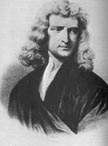Galileo
| OUTLINE OF REVOLUTIONARY IDEAS OF SCIENCE COURSE | ||
The following topics will be covered in the term:
An overview of the role science has in shaping the everyday reality of people in western society. What is it that accounts for the prestige, and power of science? (Control of the environment, the notion of progress, military power, the appeal of all-inclusive ideas.)
What distinguishes "hard sciences " from other areas of inquiry? (Empiricism, experiment quantity, prediction)
Galileo
The State of scientific knowledge before Galileo, The Aristotelian worldview and Galileo's attack on it.
Galileo's work on free fall, the quantitative approach, and the discovery of mathematical pattern as the revealer of natural law.
The Astronomy of Galileo, the reaction it engendered. The relativity principle of Galileo, as the seed of Einstein's work.
Newton

Newton: The three laws of motion as illustrated both by planetary examples and those drawn from common experience. (No vectors used or needed).
The Law of Universal Gravitation.
The Surprising generality of the laws, and how they can be used to predict everything from orbits, to the building of bridges, to the life of galaxies, To the behavior of gas in a balloon. (The triumph of mechanics)
The Impact of Newtonian thinking on the intellectual world. The notion of the World Machine. The rise of rationalism. The Influence on political thought. The elevation of the abstract.
The rise of strict materialism, and reductionism, the notion of emotions and sensations as secondary and particles and forces as primary.
The notion of strict determinism, including even the determinism of human mental states. The modern heirs of this tradition (including behaviorists) The attempt to understand a human as a machine.
The reaction to this view, the romantic rebellion. The alternative focus of other scientists (Leibnetz, Huygens) on MOTION as a central reality, leading to the discovery of the conservation of energy, one of the great laws of Physics.
Some more modern insights into these issues: are particles "more real" then the things they make up? The Heisenberg uncertainty principle as the end of absolute predictability.